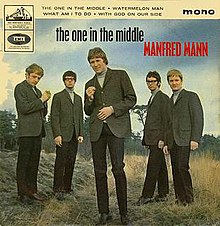
Highway 61 Revisited is the sixth studio album by the American singer-songwriter Bob Dylan, released on August 30, 1965, by Columbia Records. Dylan continued the musical approach of his previous album Bringing It All Back Home (1965), using rock musicians as his backing band on every track of the album in a further departure from his primarily acoustic folk sound, except for the closing track, the 11-minute ballad "Desolation Row". Critics have focused on the innovative way Dylan combined driving, blues-based music with the subtlety of poetry to create songs that captured the political and cultural climate of contemporary America. Author Michael Gray argued that, in an important sense, the 1960s "started" with this album.

Manfred Mann were an English rock band formed in London in 1962. They were named after their keyboardist Manfred Mann, who later led the successful 1970s group Manfred Mann's Earth Band. The group had two lead vocalists: Paul Jones from 1962 to 1966 and Mike d'Abo from 1966 to 1969. Other members of various group line-ups were Mike Hugg, Mike Vickers, Dave Richmond, Tom McGuinness, Jack Bruce and Klaus Voormann.
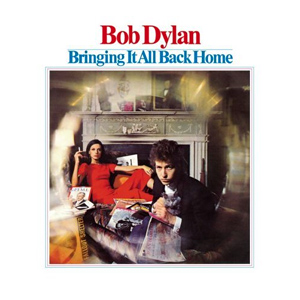
Bringing It All Back Home is the fifth studio album by the American singer-songwriter Bob Dylan, released in April 1965 by Columbia Records. In a major transition from his earlier sound, it was Dylan's first album to incorporate electric instrumentation, which caused controversy and divided many in the contemporary folk scene.
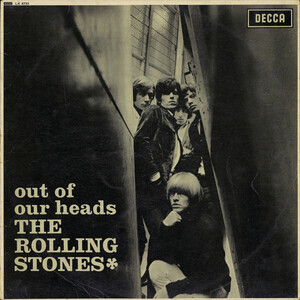
Out of Our Heads is the third studio album by the English rock band the Rolling Stones, released in two editions with different covers and track listings. In the US, London Records released it on 30 July 1965 as the band's fourth American album, while Decca Records released its UK edition on 24 September 1965 as the third British album.

For Your Love is the first American album by the English rock band the Yardbirds. Released in June 1965, it contains new studio recordings along with previously released singles. The album features some of the earliest recordings by guitarists Eric Clapton and his replacement Jeff Beck.

Having a Rave Up with the Yardbirds, or simply Having a Rave Up, is the second American album by the English rock group the Yardbirds. It was released in November 1965, eight months after Jeff Beck replaced Eric Clapton on guitar. It includes songs with both guitarists and reflects the group's blues rock roots and their early experimentations with psychedelic and hard rock. The title refers to the driving "rave up" arrangement the band used in several of their songs.

"Like a Rolling Stone" is a song by the American singer-songwriter Bob Dylan, released on July 20, 1965, by Columbia Records. Its confrontational lyrics originated in an extended piece of verse Dylan wrote in June 1965, when he returned exhausted from a grueling tour of England. Dylan distilled this draft into four verses and a chorus. "Like a Rolling Stone" was recorded a few weeks later as part of the sessions for the forthcoming album Highway 61 Revisited as its opening track.

Five by Five is the second EP by the Rolling Stones and was released in 1964. Captured during a prolific spurt of recording activity at Chess Studios in Chicago that June, Five by Five was released that August in the UK shortly after their debut album, The Rolling Stones, had appeared. The title of Five by Five is a play on words—five tracks recorded by a band with five members.
"We're Gonna Groove" is a song written by the soul artist Ben E. King and later co-credited to James Bethea. In 1964, it was released as the single B-side of King's rendition of "What Now My Love".

"Just Like a Woman" is a song by the American singer-songwriter Bob Dylan from his seventh studio album, Blonde on Blonde (1966). The song was written by Dylan and produced by Bob Johnston. Dylan allegedly wrote it on Thanksgiving Day in 1965, though some biographers doubt this, concluding that he most likely improvised the lyrics in the studio. Dylan recorded the song at Columbia Studio A in Nashville, Tennessee in March 1966. The song has been criticized for sexism or misogyny in its lyrics, and has received a mixed critical reaction. Some critics have suggested that the song was inspired by Edie Sedgwick, while other consider that it refers to Dylan's relationship with fellow folk singer Joan Baez. Retrospectively, the song has received renewed praise, and in 2011, Rolling Stone magazine ranked Dylan's version at number 232 in their list of the 500 Greatest Songs of All Time. A shorter edit was released as a single in the United States during August 1966 and peaked at number 33 on the Billboard Hot 100. The single also reached 8th place in the Australian charts, 12th place on the Belgium Ultratop Wallonia listing, 30th in the Dutch Top 40, and 38th on the RPM listing in Canada.
"With God on Our Side" is a song by Bob Dylan, released as the third track on his 1964 album The Times They Are A-Changin'. Dylan first performed the song during his debut at The Town Hall in New York City on April 12, 1963.
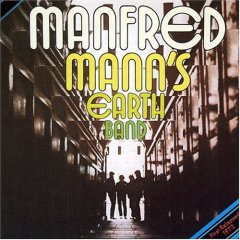
Manfred Mann's Earth Band is the eponymous debut studio album by English rock band Manfred Mann's Earth Band, released on 24 January 1972 by Polydor Records.

Solar Fire is the fourth studio album by Manfred Mann's Earth Band, released in 1973. It spent 15 weeks on the Billboard 200 charts, peaking at number 96 on 11 May 1974. It was initially intended to be a full adaptation of The Planets suite but Gustav Holst's heir, who had previously given permission for the adaptation of "Jupiter, the Bringer of Jollity" in the hit single "Joybringer", did not allow this to happen, so the band made their own "cosmic" album using mostly original themes, although the most well-known song is the Bob Dylan composition "Father of Day, Father of Night", which is in the Earth Band's live set to this day and remains a popular song on rock radio. "Pluto the Dog" and the two-part "Saturn, Lord of the Ring/Mercury, the Winged Messenger" are instrumentals, and "Earth the Circle Part 2" features only two lines of sung vocals. The album is often considered to be the peak of the early Earth Band line-up and, for a lot of progressive rock reviewers, the pinnacle of Mann's career in general.

Mighty Garvey! is the fifth and final studio album by Manfred Mann, released on 28 June 1968 by Fontana Records. It was the last recorded by the band after the change of direction and personnel of their 1966 album As Is. It continued a transition away from jazz and blues towards self-composed art-pop. Despite including two UK top 5 hit singles, the album did not chart and the band split up the year after. In the US and Canada, it was released as The Mighty Quinn by Mercury Records.

Machines is an EP by Manfred Mann, released in 1966. The EP is a 7-inch vinyl record and released in mono with the catalogue number His Master's Voice-EMI 7EG 8942. The record was the number 1 EP in the UK number-one EP for 1 week, starting 28 May 1966.

Instrumental Asylum is an EP by Manfred Mann, released in 1966. The EP is a 7-inch vinyl record and released in mono with the catalogue number His Master's Voice-EMI 7EG 8949.

"Ha! Ha! Said the Clown" is a song written by Tony Hazzard, first recorded by British pop group Manfred Mann. Hazzard claims the song "came out of the blue" though he did not demo it for weeks. Following recording a demo, he approached manager Gerry Bron, who liked it enough to want one of his groups, Manfred Mann, to record it. Manfred Mann recorded their version of the single on 10 February 1967 at Philips Studio in Marble Arch, London, together with producer Shel Talmy. It was the second of three singles Manfred Mann recorded to feature the Mellotron.
"Come Tomorrow" is a song written by American songwriters Bob Elgin, Dolores Phillips and Frank Augustus for rhythm and blues singer Marie Knight, who issued it as a single in October 1961 through Okeh Records, a release which received good reviews, though failed to chart. The best known version of the song was recorded by British pop band Manfred Mann, who took it to the top-ten in the United Kingdom in 1965.

The Five Faces of Manfred Mann is the debut British and second American studio album by Manfred Mann. It was first released in the United Kingdom on 11 September 1964 by His Master's Voice. In late October/early November, the album was released in Canada by Capitol Records. The Canadian track listing was almost the same as the UK version, except it included the hit "Do Wah Diddy Diddy" instead of "I've Got My Mojo Working". The record has been called "one of the great blues-based British invasion albums; it's a hot, rocking record that benefits from some virtuoso playing as well".
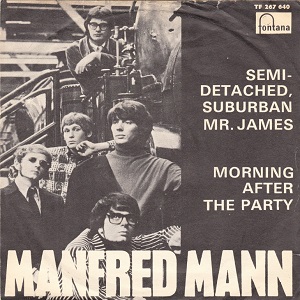
"Semi-Detached, Suburban Mr. James" is a song written by songwriters Geoff Stephens and John Carter, recorded by English pop group Manfred Mann in 1966. Previous to this, it was recorded by the band Herbie's People who were signed to CBS and had recorded other John Carter songs. The original title was "Semi-Detached, Suburban Mr. Jones" and was recorded that way by Herbie's People. Their version was pulled by CBS when Manfred Mann said they would record it. It was subsequently issued but only in the USA on the Okeh label. Stephens and Carter, who were writers for a publishing company on Denmark Street, London, wrote the song in a style different from their usual compositions, as love was not the prevalent theme. Introduced to the song by producer Shel Talmy, Manfred Mann recorded it at Philips Studio in August 1966. Released by Fontana Records on 21 October 1966, the song was backed by drummer Mike Hugg's composition "Morning After The Party" as the group's second single on the label. Keyboardist Manfred Mann plays the Mellotron on the recording; it was one of the earliest recordings featuring the instrument. Following a trend set by Bob Dylan, the song tackles the subject of life in British middle class suburbia from the perspective of a narrator, who laments the loss of a lover after her marriage to another man.
